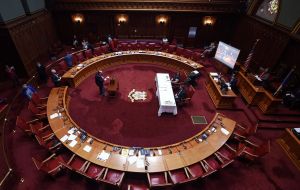MercoPress. South Atlantic News Agency
It-s official, Joe Biden is the 46th elected president of the United States
 “The flame of democracy was lit in this nation a long time ago,” Biden said in his speech to mark his Electoral College victory.
“The flame of democracy was lit in this nation a long time ago,” Biden said in his speech to mark his Electoral College victory.  The vote, typically a formality, assumed outsized significance in light of President Donald Trump’s extraordinary effort to subvert the process
The vote, typically a formality, assumed outsized significance in light of President Donald Trump’s extraordinary effort to subvert the process Democrat Joe Biden called on Americans to “turn the page” on the Trump era in a prime-time speech on Monday, hours after prevailing over the Republican in the state-by-state Electoral College vote that officially determines the U.S. presidency.
The vote, typically a formality, assumed outsized significance in light of President Donald Trump’s extraordinary effort to subvert the process due to what he has falsely alleged was widespread voter fraud in the Nov. 3 election.
Some Trump supporters had called for protests on social media, and election officials had expressed concern about the potential for violence amid the president’s heated rhetoric. But Monday’s vote proceeded smoothly, with no major disruptions.
California, the most-populous U.S. state, put Biden over the 270 votes needed to win the Electoral College when its 55 electors unanimously cast ballots for him and his running mate, Kamala Harris. Biden and Harris - the first woman, first Black person and first Asian American to become vice president-elect - will be sworn in on Jan. 20.
Biden earned 306 electoral votes in November compared with 232 for Trump.
“The flame of democracy was lit in this nation a long time ago,” he said in his speech to mark his Electoral College victory. “And we now know that nothing — not even a pandemic — or an abuse of power — can extinguish that flame.
“In this battle for the soul of America, democracy prevailed.”
Under a complicated system dating back to the 1780s, a candidate becomes U.S. president not by winning the popular vote but through the Electoral College system, which allots electoral votes to the 50 states and the District of Columbia based on congressional representation.
In 2016, Trump defeated Democrat Hillary Clinton despite losing the national popular vote by nearly 3 million ballots. Biden won the popular vote in November by more than 7 million votes.
Electors are typically party loyalists who are unlikely to break ranks, although there are sometimes a handful of electors who cast ballots for someone other than the winner of their states. In 2016, for instance, seven electors went “rogue,” a historically unusual number but still far from enough to change the outcome.
Few observers had expected Monday’s vote to alter the election’s outcome. With Trump’s legal challenges floundering, the president’s dim hopes of clinging to power rest in persuading Congress not to certify the Electoral College vote in a special Jan. 6 session - an effort almost certain to fail.




Top Comments
Disclaimer & comment rulesCommenting for this story is now closed.
If you have a Facebook account, become a fan and comment on our Facebook Page!